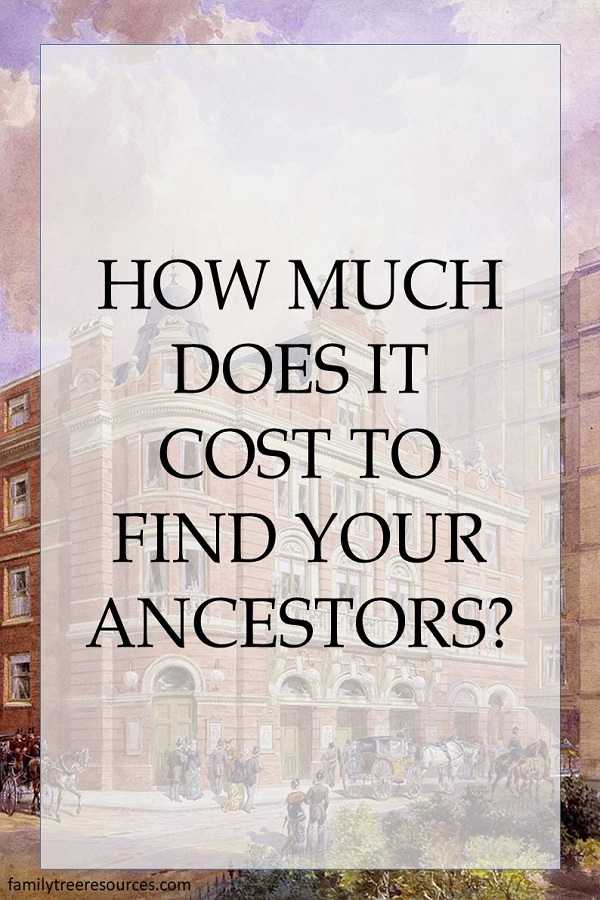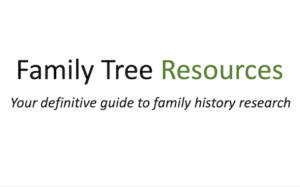
When you first begin thinking about finding your ancestors by tracing your family tree, it can easily become overwhelming because many different options are available to you.
The cost of tracing your family tree can vary considerably as it depends on many factors including how far back you wish to go, how much research you wish to undertake, and the number of locations your family originate from, especially if you wish to travel to these localities.
Unfortunately, it is inevitable that you will have to pay to conduct genealogical research at some stage, whether that is ordering birth, death or marriage certificates, taking out a subscription to a family history website, travelling to record offices, paying record offices’ charges, or hiring a professional genealogist to conduct research on your behalf.
Online Records
A lot of information is freely available online, such as transcripts of parish registers, the GRO Index or Census Returns. You may find that it is cheaper and easier to look at these resources online rather than spending time and money travelling to a record office.
Many websites can be accessed free of charge, such as FamilySearch, FreeBMD, or the General Register Office website, that gives access to the GRO Index.
FamilySearch
FamilySearch is a website that has been created by the Church of Jesus Christ of Latter Day Saints.
You can search through many parish registers and census returns that have been made freely available, but it must be noted that the resources are by no means complete, with several parish registers not yet included in their database.
More records are being added daily, however, and it can help you to find a record in a parish register. You should always check the original record, however, because their record only contains the bare minimum of information, not including any additional information that may have been added to the original record by the clergyman.
One application that is accessible on their website is their family tree application that allows you to upload your family tree to the internet.
One drawback with this application, however, is that it allows anyone to make changes to your family tree. They can add and/or delete people regardless of how accurate the information being added to your family tree actually is!!
FreeBMD
FreeBMD provides access to the GRO Index of England and Wales. Compiled by volunteers, the information contained on the website is largely complete for births 1837-1983, marriages 1837-1983 (1969 is incomplete), and deaths 1837-1983 (1904 and 1980 is incomplete).
General Register Office
The General Register Office website provides free access to the GRO Index for births and deaths. Births go up to 1919, and 1984-2004, and deaths to 1957 and 1984-2019. The index does not currently include marriages.
The one big advantage to the General Register Office’s website is that the index includes the mother’s maiden name from 1837, whereas the Index included on FreeBMD only contains that information from 1911.
The fact that the General Register Office includes the mother’s maiden name in their Index can be very helpful in tracking down a marriage, making it that much easier to continue research.
The death index includes age at death from 1837, whereas the FreeBMD index only has that information from 1866. This information can help you to track down a baptism date, especially if the person was born before civil registration began in 1837.
Commonwealth War Graves Commission
If your ancestor was killed during WW1 or WW2, you may be able to find a record of his grave in the War Dead section of the Commonwealth War Graves Commission’s website. This record normally includes his name, regiment and unit, date of death, his age, and where he was buried.
The record can also include additional information, such as his parents names, their address, and if he was married, his widow’s name and her address.
The record of my relative Leslie John Dunkley states that he was in the Northamptonshire Regiment 7th Battalion, that he died on 27 September 1915 aged 21, and that he was buried in Loos Memorial.
It also states that he was the son of John Samuel and Bessie Dunkley of 150 Ashburnham Road, Northampton.
Paying To Access Records – Which Website Should I Choose?
Although there are websites that are free to access, such as those mentioned above, and can help you to begin your research journey, they do not provide access to all the resources you will need when conducting research.
When you are choosing which website you want to use to build your family tree past birth, marriage and death dates, you must first ask yourself how much information you want to include in your family tree, and how far back you wish to go.
If, for example, you wish to learn more about your ancestor’s military career, you will need to ascertain that basic information before beginning to look for his military record to distinguish him from records of people with the same name.
If there is something specific you wish to learn about his military career, you should ensure that the website provides access before paying for a subscription.
Ancestry
If you are UK based, Ancestry costs £13.99 per month (£69.99 for 6 months – single payment) to access their basic package that includes access to all UK records. This includes parish registers, census returns, criminal records, electoral rolls, immigration records, military records, and wills.
If you find, however, that your ancestors immigrated to the UK, or emigrated to another country, you may wish to purchase their full package that provides access to all records held on Ancestry, which costs £19.99 per month (£99.99 for 6 months – single payment). This package includes records from Australia, Canada, New Zealand and the United States of America.
Another package offered by Ancestry offers access to all the above, Forces War Records, and their extensive newspaper collection. This package costs £29.99 per month (£149 for 6 months).
This is why it is so important to decide exactly how much you wish to discover about your ancestors, and to ensure that the records you wish to access are available before paying for a subscription. It is prudent to consider taking advantage of a free trial to see if you like the website before committing to paying for a subscription.
Ancestry
Ancestry is great for anyone who does not have the time to, or is unable to, visit Record Offices or Libraries.
It is especially good if you wish to access records from the comfort of your home.
Read my in-depth review to find out more about its features, advantages, and disadvantages.
FindmyPast
FindmyPast costs £10.99 per month for their Starter package, where you should be able to go back five generations, and make contact with people who may have ancestors in common with you.
They also offer a ‘plus’ package, costing £14.45 per month, where you are able to access all the records in the starter package, plus search the 1939 Register and access their collection of Irish, UK parish, military, and travel records.
The ‘Pro’ package offers access to all of the above, but in addition, you are also able to search worldwide records and their newspaper collections. The worldwide records include US, Canada, Australia and New Zealand.
They also offer 3 month subscriptions – these are the ‘plus’ and ‘pro’ packages mentioned above, and their Premium subscription, where you are also able to search the 1921 Census. This is currently only accessible through FindmyPast. The 3 month subscriptions cost £38.49, £49.99, and £59.99 respectively.
You can also check records available on FindmyPast. From here you can filter your search by country, county and year.
FindmyPast
FindmyPast is good for anyone, whether they are just starting their family history journey, or have already conducted some research.
It is especially good for people who wish to read newspaper articles.
Read my in-depth review to find out more about its features, advantages and disadvantages.
This is especially true if you purchase a monthly subscription, and for some reason decide not to renew your subscription. I fell foul of that when I first started genealogical research!
Not All Records Are Available Online
Although Ancestry and FindmyPast provide access to many records and resources, not all records are available online, so you may find that to continue your research you have to go to a record office to continue your research.
When you are planning your trip to a record office, it is important to consider additional expenditure such as accommodation, food, travelling costs, and any charges that may be made by the record office. If you wish to take many photocopies of documents at a Record Office, or print off records at home, it is important to remember that even these costs can mount up, and you also have to consider whether you have the space to store them!!!
Time Is Money!!
If you are one of the people who believes time is money, you will spend a lot of it whilst you are researching your family tree, but I hope you will consider that this time/money is well spent!!
It is going to take time to research your family history. You can spend many hours looking at census returns, certificates, diaries, letters and many other resources. Even travelling to a record office takes time!! I have thoroughly enjoyed all the time I have spent researching my ancestry, however.
Ancestors Came From Overseas
If you find that your ancestors immigrated to the UK, or emigrated to another country, this can add hundreds, if not thousands, of pounds to the cost of researching your ancestry, especially if you decide to follow your ancestors’ journey and conduct research in that country.
For more information regarding planning a genealogy research trip, please read my article: planning a genealogy research trip.
Transcripts of Documents
If you cannot visit a record office, many family history societies have published transcripts of parish registers, memorial inscriptions and census returns. You may be able to purchase these items from the society if you wish.
These resources can either be in book format, on microfiche, or on CD-Rom. If you wish to purchase microfiche, you may also have to invest in a microfiche reader.
Organising Your Research
Organising your research is very important because it makes it easier for you to access the information you have collected. There are many different ways that you can organise your research, which includes using a filing system or computer program, or making notes using a family history chart. It must be borne in mind that any of these options require a monetary consideration.
For more information regarding how to record your family history, please read my article: recording family history: why organising research is important.
Professional Genealogists
If you wish, you can also pay to have your family history research compiled by a professional genealogist, either because you do not have the time to conduct your own genealogical research or have hit a brick wall and are unsure how to proceed.
Professional genealogists’ fees can range in price from £15 per hour to £50 per hour plus any additional expenses. Many genealogists also charge a fixed fee, but it is crucial that you agree a fee before any research is undertaken.
All in all, researching your family history can be a very rewarding, albeit expensive, hobby. It just depends on how much information you want to uncover, how far back you wish to go, and the number of locations involved.
